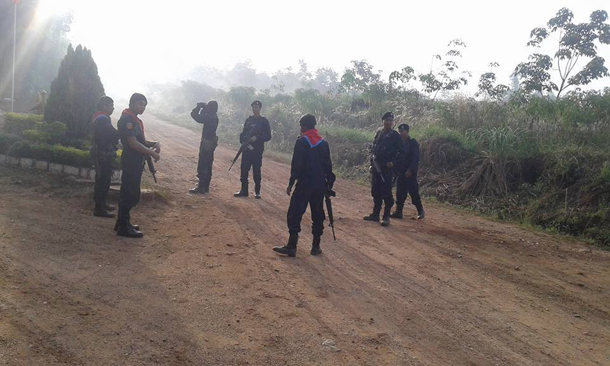The Burma Army has seized two guns and a handheld transceiver from a Mon National Liberation Army (MNLA) base on Thursday afternoon in Kyaikmayaw Township, Mon State.
This was a surprise raid in what has been, over the last twenty years, a zone of largely quiet coexistence between the Burma Army and the non-state ethnic armed group.
The annual collection of “donations” by the MNLA from local residents had contributed to recent tensions with the Burma Army, but a formal link with the raid has not been established.
Nai Hong Sar Bong Khaing, a spokesperson from the New Mon State Party (NMSP), the political wing of the MNLA, told The Irrawaddy: “They raided our base and took one AK 47 assault rifle, one 9mm pistol and one walkie-talkie. But they did not detain our members.”
“[The Burma Army] threatened our members, saying, ‘Who allowed you to come here?’ Our members responded that they had been ordered to by their leaders,” said the NMSP spokesman.
The MNLA has maintained bases in the area since a ceasefire was signed with the Burmese military government in 2005. The area has been free of conflict in the years since; this is the first time tensions have prompted such an aggressive maneuver.
The NMSP spokesman said they did not know exactly what prompted the Burma Army’s raid.
“We have already informed the [union-level] security and border affairs minister about the incident over the phone. We will ask [the Burma Army] why they did it,” the spokesman said.
The Security and Border Affairs ministry is one of three ministries controlled by the Burmese military, in accordance with the military-drafted 2008 Constitution.
The NMSP spokesman reported on growing tensions between the Burma Army and the MNLA in the area in recent weeks, connected to the MNLA’s yearly revenue-acquisition drive.
“Our members asked for monetary donations from our people in the area. This is our yearly donation drive. The Burma Army objected and told us to stop,” he said.
In recent months, tensions have developed in Mudon, Thanbyuzayat and Kyaikmayaw townships of Mon State: the Burma Army ordered the MNLA to withdraw from some bases, claiming were beyond the lines agreed to in the ceasefire.
In the ceasefire reached in 1995—renewed in 2012 under the nominally civilian, military-backed government of President Thein Sein—the MNLA and the Burma Army agreed to share control of the area, separated by lines of control.
The NMSP/MNLA did not sign the Nationwide Ceasefire Agreement reached between the Thein Sein government and eight ethnic armed groups in October last year. It is part of the United Nationalities Federal Council, an alliance of ethnic armed groups whose members the present government is trying to woo into the upcoming “21st Century Panglong” peace conference.

















